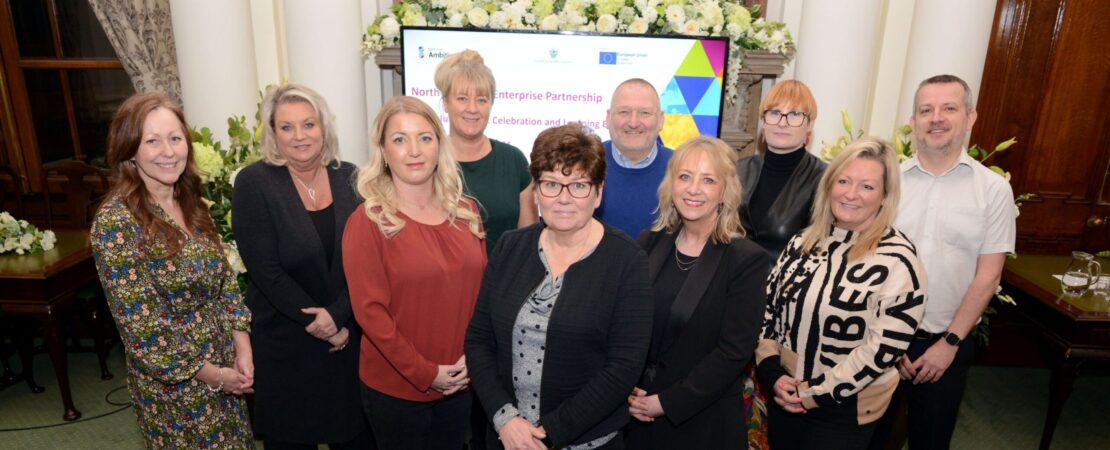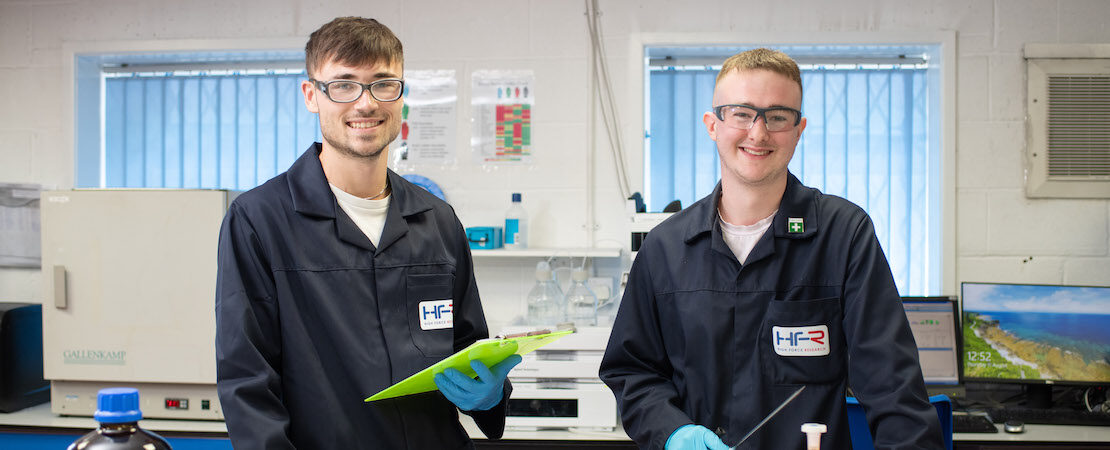In conversation with Jane Klotz, HR Manager at High Force Research
Why did High Force Research choose to invest in apprenticeships?
There are two reasons why the company is so supportive of apprenticeships.
The first is that it’s at the heart of our directors whose own career journeys started down that route. It’s very much a value that we have within the organisation; to give young people an opportunity and route into life sciences.
And second, we see it as a great way to attract young talent, especially those that feel University isn’t the route for them. We could be losing out on some great chemists by only taking on graduates.
What are some of the benefits of taking on an apprentice?
We can mold apprentices in the way we want to, and by learning on the job they very quickly become productive. We are able to get our apprentices working alongside our existing team early on and teach them the things we think they need to learn.
The two apprentices in the company at the moment – Charlie and Jude – are both very committed, and so are the two new apprentices we’re taking on in the autumn. They’ve all demonstrated a real willingness to learn and a passion for life sciences.
Apprenticeships are cost effective too. We’ve chosen to pay more than the apprenticeship rate, and we review salaries annually as they progress through their training. There are no tuition fees for the apprentice to pay and because we’re an SME we only pay a nominal amount towards their academic learning. So it’s really good value for money.
Do you think there is a lack of understanding in the sector about the value of apprenticeships?
Yes, definitely. Historically people still see apprenticeships as being a poor relation to other qualifications.
Apprenticeships are certainly working for us, and the conversations I’ve been having with peers in recent weeks suggest they are beginning to open their eyes and see them as a way forward too.
Why do you think apprenticeships and other vocational qualifications are an important route to careers in health and life sciences?
University isn’t for everyone; I didn’t go to university. How many 18 years old really know what they want to do as a career. Choosing the right degree, and the cost implications that come with it, can be difficult depending on your socio-economic background.
Apprenticeships give people the option to pursue something they love and be on a financial par with graduates. Our apprentices will achieve two qualifications, a degree in Laboratory Science and an apprenticeship qualification. The apprenticeship covers a lot more around business management and all the processes the apprenticeship framework covers. It makes them a very well rounded individual.
Apprenticeships build that understanding of the workplace and develop a business mindset.
Do you think apprenticeships can help address some of the skill gaps in the sector?
Yes, definitely. Because of the way the course is structured and apprentices join from age 18 and 19, we can start to lay those foundations to help them understand what skills and knowledge they need, how we do business, and what the world of work is about. And at the same time they’re learning the technical skills and knowledge that enable them to do the job effectively.
How has the High Force Research apprenticeship programme benefitted the company?
Both Charlie and Jude have a real enthusiasm for what they do and that’s reflected in the quality of their work.
In the second year of his apprenticeship, Jude was one of our most experienced QC analysts. His productivity, even within the first two years of his four-year course, was phenomenal. And Charlie is very much the same.
In the first six months of an apprenticeship, people are picking up the skills, techniques and knowledge so they’re not as productive at that stage. But that changes very quickly and Charlie and Jude are now training some of our new graduates.
Graduates often come to us with a degree in chemistry, but they’ve then got to apply that knowledge to a workplace environment. And it’s all quite new for them; it’s on a completely different scale to what they’ve experienced at University. They don’t, for example, understand the quality system we work towards, whereas our apprentices are learning that from day one. That’s why they’re able to train and mentor new starters.
Why should other health and life sciences businesses consider taking on apprentices?
It’s good for business. I think people worry its going to be a huge burden but it’s actually contributing to your success.
It helps with succession planning too as you’re creating a pipeline of future talent. You also get to nurture that talent and help people grow through their careers.
We’re making sure our apprentices have the opportunity to work in different areas too, so Charlie, for example, will be working with the R&D team. He will be building on the skills he already has.
It’s good for business and I think it’s the right thing to do; it’s a moral obligation.
What advice would you give to other health and life sciences businesses that are considering taking on apprentices?
Think about where that young person would be best placed within the business. Have you got a good team around them and can you allocate a mentor. Do you need to provide some training for that person to be a good mentor or do you already have those skills within your existing team?
Be really clear that you’re giving that young person the best possible experience so you’re setting them up to succeed, not to fail.
We decided to take on two apprentices so they could buddy up with each other. It can be tough fitting in work, study and meeting various deadlines. We do provide time for them to study, and we also provide flexible working. Businesses should think about their working pattern and if they have the right supervision in place.
Finding the right partner is also key. Some providers ask apprentices to go in once a week, and others provide distance learning. Businesses need to consider what the right learning style is for each individual apprentice. You do need to make sure your apprentices are hitting their milestones, and the partnership provider will help with that.
We also had no problem finding apprentices. We advertised via the government website and within one week we had 50 applicants.
I think businesses have a responsibility to create opportunities for young people. They’re the talent of the future.
In conversation with Charlie Ellison and Jude Humphrey, apprentices at High Force Research
Why did you choose to study an apprenticeship over other routes to employment, e.g. A Levels?
Jude: When I was at school I always liked the practical side of things, and the unique appeal of an apprenticeship was that I’d get to work in a lab every day doing hands on work alongside the academic work. That really appealed to me
An apprenticeship is a really good opportunity to get the skills you need in industry whilst you’re studying. And you’re also earning a wage at the same time.
Charlie: For me it was about gaining experience in the workplace, specifically in a lab environment, whilst still achieving a degree. It really gives you an edge over people that go down the university route because they have the theory, but not the manufacturing experience.
You save a lot of money too, there are no tuition fees to think about. Our fees are paid and we earn a wage.
How do you think gaining practical experience while you study will benefit your career?
Charlie: When I’ve spoken to chemists that came from an undergraduate route, they’ve told me lots of jobs they’ve applied for require two years’ experience. Because Jude and I have chosen an apprenticeship route, we now have four years’ experience. That gives us a significant head start over other people. It really improves your confidence as you develop in your career.
Jude: If we were up against the same person going for a job, but they were fresh out of university, we’ve got the same degree but five years of industry experience and we’re fully trained. That gives us a massive advantage over that person.
Also, some of the work I do at university as part of my apprenticeship feeds into my role at High Force Research, and vice versa. I work in analytical chemistry and we’ve just got a new analytical unit at university. A lot of the work we’ve done I already know, which has given me a head start with coursework. I’m also learnt a lot of new things that I can bring into the business too.
What do you enjoy most about your apprenticeship?
Jude: I think for me it’s getting to do lab work everyday. I get to do a range of different analytical techniques and employ a wide range of skills. I’m always being trained in new things so work always feels fresh and different.
As part of our apprenticeship we get 20% of our time to invest in studying and training so I’ve done a first aid course and fire warden training, which has given me some additional qualifications.
We also still get to visit University and take part in social events with other people on our course, so we’re not missing out on that university experience either.
Charlie: There’s a great team of chemists and office staff here who are always available to help me, Jude and new starters to the business. It’s such a nice friendly group of people. The management team is always pushing to give us extra opportunities and experiences too. I got to work in our research site at NETPark and do some completely different chemistry, which was an excellent experience.
It’s a nice feeling to know you’re being trusted with new opportunities. We’re not treated like an apprentice; we feel part of the team.
Why should other young people interested in a career in health and life sciences consider an apprenticeship?
Charlie: After doing it for three years, I definitely wouldn’t change my decision about doing an apprenticeship. For me, it’s been a much better experience than going to university.
I’ve really valued being trusted and having the opportunity to work alongside high-level chemists as well as lecturers. Jude and I are currently the only two apprentices at High Force Research and we get to be around PhD and masters chemists who share their knowledge with us and help us develop. We learn things you just wouldn’t cover at university.
Jude: You get a real in-depth knowledge of industry and understand how a company works. People that do a degree don’t get that. We’ve gained skills in other areas too, like business improvement, and health and safety. We’ve also seen how to take an idea right through to the product stage.
There’s also the added benefit that, for most people studying an apprenticeship, you have a guaranteed job after too.
To find out more about High Force Research, visit highforceresearch.com
To find out more about apprenticeships, visit northeastambition.co.uk/options






